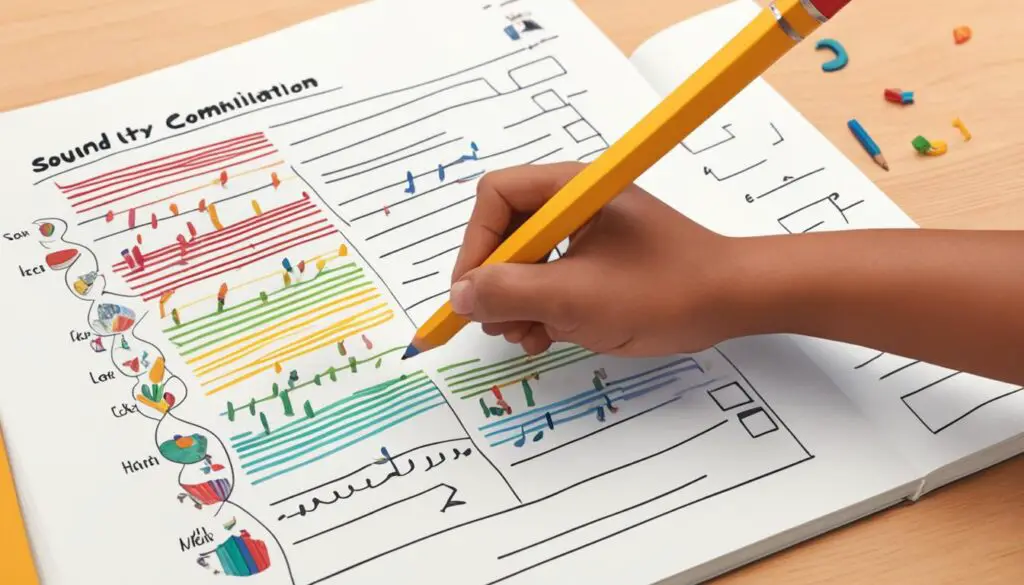
Early Literacy Development: Essential Strategies for Parents
As a professional copywriting journalist, in this article, I will provide essential strategies for parents to support their child’s early literacy development. It is crucial to start building the foundation of reading and writing skills from a young age, as it sets the path for future academic success.
Key Takeaways
- Early literacy development plays a significant role in a child’s academic success.
- Parents should create a literacy-rich environment at home to foster a love for reading.
- Building vocabulary and language skills is essential for improving literacy.
- Phonics instruction and phonological awareness are crucial for strong reading and writing skills.
- Reading aloud and shared reading activities provide numerous benefits to early literacy development.
Creating a Literacy-Rich Environment
A literacy-rich environment at home is crucial for instilling a love for reading in children. Here are some practical tips that can create a perfect reading environment for your child:
Set Up a Reading-Friendly Space
Ensure that the reading space in your home is comfortable, well-lit, and quiet. Distracting elements such as TV and electronic devices should be kept away from this area to minimize distractions and promote a focused reading experience.
Provide Access to Age-Appropriate Books
Offer a wide variety of books that are age-appropriate and of different genres and formats. Picture books, non-fiction books, and magazines can pique the interest of young readers and help promote joy in reading.
Encourage a Love for Reading
Make reading fun by incorporating it into family activities. Allow children to choose the books they want to read and motivate them to read aloud. Encourage your child to talk to you about the books they are reading and ask questions to help develop their comprehension skills.
“In a literate culture, people use writing to externalize their thoughts, to fix them in a permanent form and to share them with others.” – Frank Smith
Building Vocabulary and Language Skills
Strong vocabulary and language skills are crucial components of early literacy development. Building a rich and diverse vocabulary can enhance a child’s comprehension and foster a love for reading and writing. Parents can help their children develop language skills by incorporating various strategies into their daily routine.
Encourage Meaningful Conversations
One effective way to develop language skills is by engaging in meaningful conversations with your child. Asking open-ended questions, discussing current events, and sharing personal stories are great ways to promote language development. Encourage your child to ask questions, as this will help them develop critical thinking skills.
Read and Explore New Words
Reading age-appropriate books is an excellent way to introduce new vocabulary words to your child. As you read, discuss the meaning of unfamiliar words and encourage your child to use them in a contextually appropriate way. Another fun way to explore new words is by playing vocabulary games, such as word association or Scrabble.
Engage in Language-Rich Activities
Engaging in language-rich activities, such as singing, storytelling, and role-play, can also help develop language skills. These activities promote creativity, imagination, and communication, which are essential for language development. For example, pretend play can help your child develop their narrative skills, while singing teaches them about rhyming and rhythm.
Tip: Encourage your child to retell a story they have read or heard. This activity can help improve their comprehension skills, enhance their vocabulary, and foster a love for storytelling.
Phonics Instruction and Phonological Awareness
Phonics instruction and phonological awareness are crucial skills that children need to develop strong reading and writing abilities. Phonological awareness refers to the ability to recognize and manipulate the sounds of language, while phonics instruction involves learning the relationship between letter symbols and their sounds.
To help your child develop these skills, try adopting some of the following strategies:
- Introduce letter sounds: Teach your child the sounds each letter makes. You can use flashcards, alphabet books, or online resources to introduce letter sounds gradually.
- Promote sound recognition: Encourage your child to identify and distinguish sounds in words. You can play games like “I Spy” or use sound recognition apps to help them practice.
- Foster phonemic awareness: Help your child develop the ability to manipulate sounds in words by engaging them in activities like rhyming, blending, segmenting, and deleting sounds. You can use online resources or phonemic awareness books to provide additional support.
By implementing these strategies in your child’s learning routine, you can help them develop the skills they need for successful early literacy development.

Reading Aloud and Shared Reading
Reading aloud and shared reading experiences are among the most beneficial practices for promoting early literacy development in children. Not only do they encourage a love for reading, but they also enhance language skills, vocabulary development, and even cognitive abilities. As a parent, you can make reading a daily habit and choose appropriate books that match your child’s age and interests. You can also engage your child in interactive reading activities, such as asking questions, pointing to pictures, and encouraging them to retell the story in their words.
The Benefits of Reading Aloud
Reading aloud to your child is a powerful way to stimulate their imagination, curiosity, and language development. It helps to build a foundation for comprehension and critical thinking as they learn to associate words with meaning. Reading aloud also provides an opportunity for shared experiences and emotional connections, which can help to strengthen the bond between parent and child.
“Children are made readers on the laps of their parents.” – Emilie Buchwald
Shared Reading
Shared reading is a process whereby parents and children take turns reading parts of a book together or discussing the story. This technique is especially effective for engaging children in the reading process, developing comprehension and promoting oral language skills. As you read together, ask your child questions and encourage them to ask questions too. You can also point out interesting details in the pictures and relate the story to their own experiences.
| The Benefits of Reading Aloud and Shared Reading | |
|---|---|
| Encourages a love for reading | Enhances language skills |
| Stimulates imagination and curiosity | Develops comprehension |
| Strengthens parent-child bond | Promotes oral language skills |
Remember, the most important aspect of reading aloud and shared reading is to make it a fun and enjoyable experience for both you and your child. Through these simple practices, you can foster a lifelong love for learning and create precious memories that will last a lifetime.

Conclusion
In conclusion, early literacy development plays a crucial role in a child’s academic success. As parents, we can support our child’s reading and writing skills by implementing essential strategies such as creating a literacy-rich environment, building vocabulary and language skills, teaching phonics, and engaging in shared reading experiences.
By setting up a reading-friendly space at home, providing access to age-appropriate books, and encouraging a love for reading, we can create an environment that fosters a lifelong passion for learning. Additionally, by expanding our child’s vocabulary, engaging in meaningful conversations, and promoting phonological awareness, we can help them develop strong foundational skills for future academic success.
Remember, reading aloud and shared reading experiences provide opportunities for us to bond with our children while simultaneously enhancing their literacy development. By making reading a daily habit and engaging in interactive reading activities, we can instill in them the love for reading, and create memories that will last a lifetime.
As parents, we have the power to shape our child’s future. By actively participating in our child’s early literacy development, we can set them up for a lifetime of success and create a bright future for them.
FAQ
Why is early literacy development important for children?
Early literacy development is crucial for children as it sets the foundation for their future academic success. It helps them develop strong reading and writing skills, enhances their vocabulary and language skills, and fosters a love for reading.
What are some essential strategies for parents to support their child’s early literacy development?
Parents can support their child’s early literacy development by creating a literacy-rich environment at home, building vocabulary and language skills through meaningful conversations and activities, providing phonics instruction and promoting phonological awareness, and engaging in reading aloud and shared reading experiences.
How can parents create a literacy-rich environment at home?
Parents can create a literacy-rich environment at home by setting up a reading-friendly space, providing access to age-appropriate books, and encouraging a love for reading in their children through regular reading activities and book discussions.
What strategies can parents use to build their child’s vocabulary and language skills?
Parents can build their child’s vocabulary and language skills by introducing new words, having meaningful conversations, engaging in word play activities, and exposing their child to a variety of language-rich experiences such as storytelling and singing.
Why is phonics instruction important in early literacy development?
Phonics instruction is important in early literacy development as it helps children decode words, understand the relationship between sounds and letters, and develop strong reading and spelling skills. It lays the foundation for fluent reading and writing.
How can parents promote phonological awareness in their children?
Parents can promote phonological awareness in their children by introducing letter sounds, playing rhyming games, engaging in sound recognition activities, and emphasizing the individual sounds in words through activities like segmenting and blending.
What are the benefits of reading aloud and shared reading?
Reading aloud and shared reading experiences have numerous benefits. They help develop listening skills, increase vocabulary, improve comprehension, foster a love for reading, and provide opportunities for meaningful discussions and interactive learning.
How can parents make reading a daily habit?
Parents can make reading a daily habit by setting aside dedicated reading time, incorporating books into daily routines, reading together as a family, and providing a wide variety of books that cater to their child’s interests and reading level.
How can parents engage their child in interactive reading activities?
Parents can engage their child in interactive reading activities by asking questions during and after reading, encouraging their child to make predictions, relate the story to their own experiences, and participate in activities that extend the story, such as role-playing or creating artwork inspired by the book.